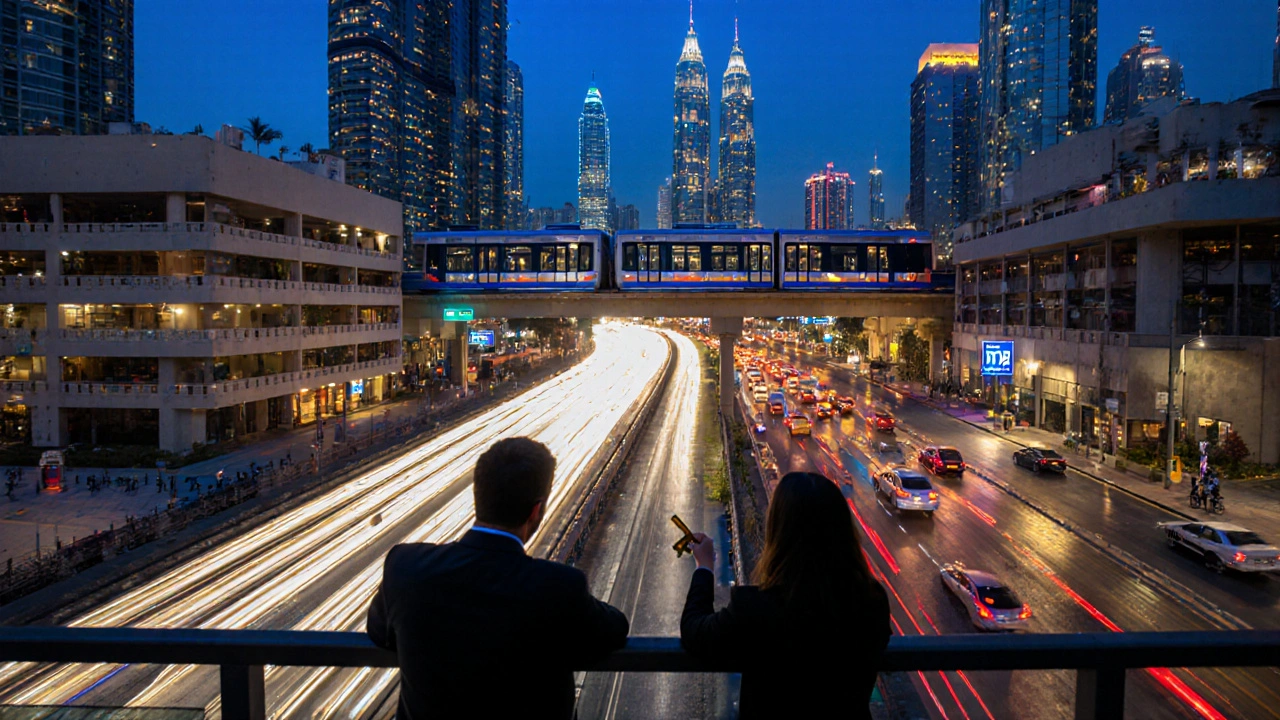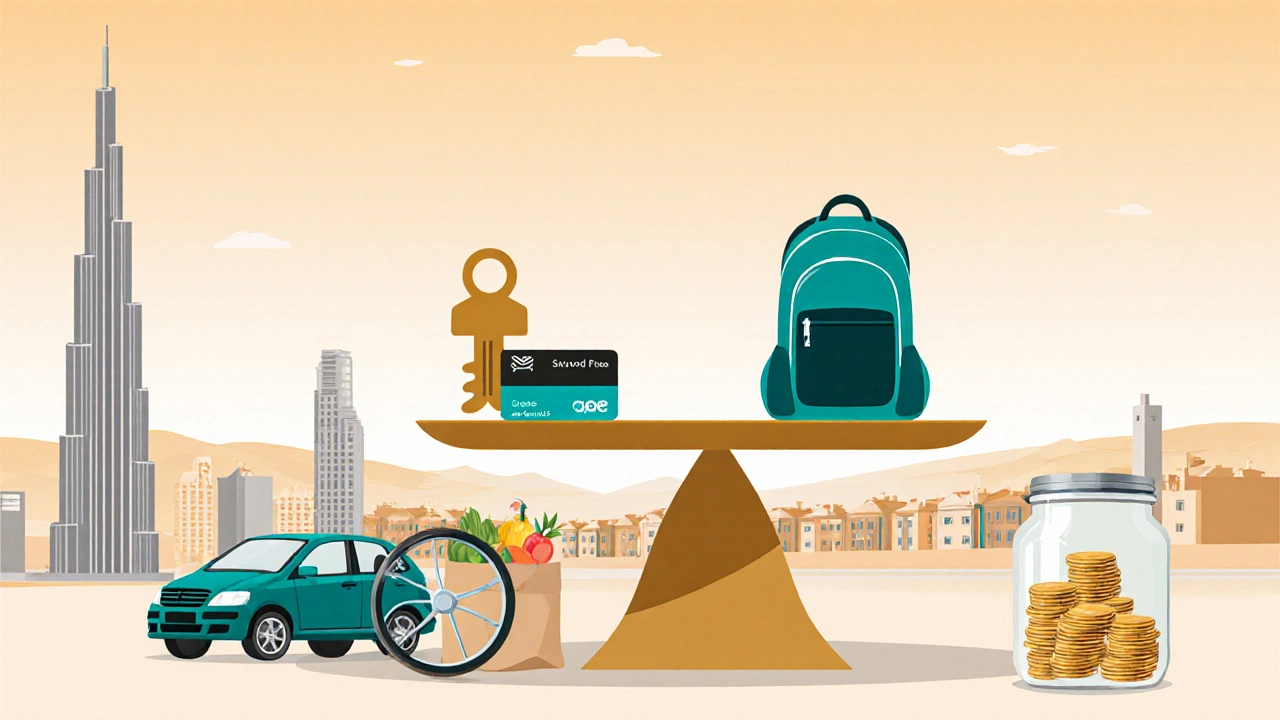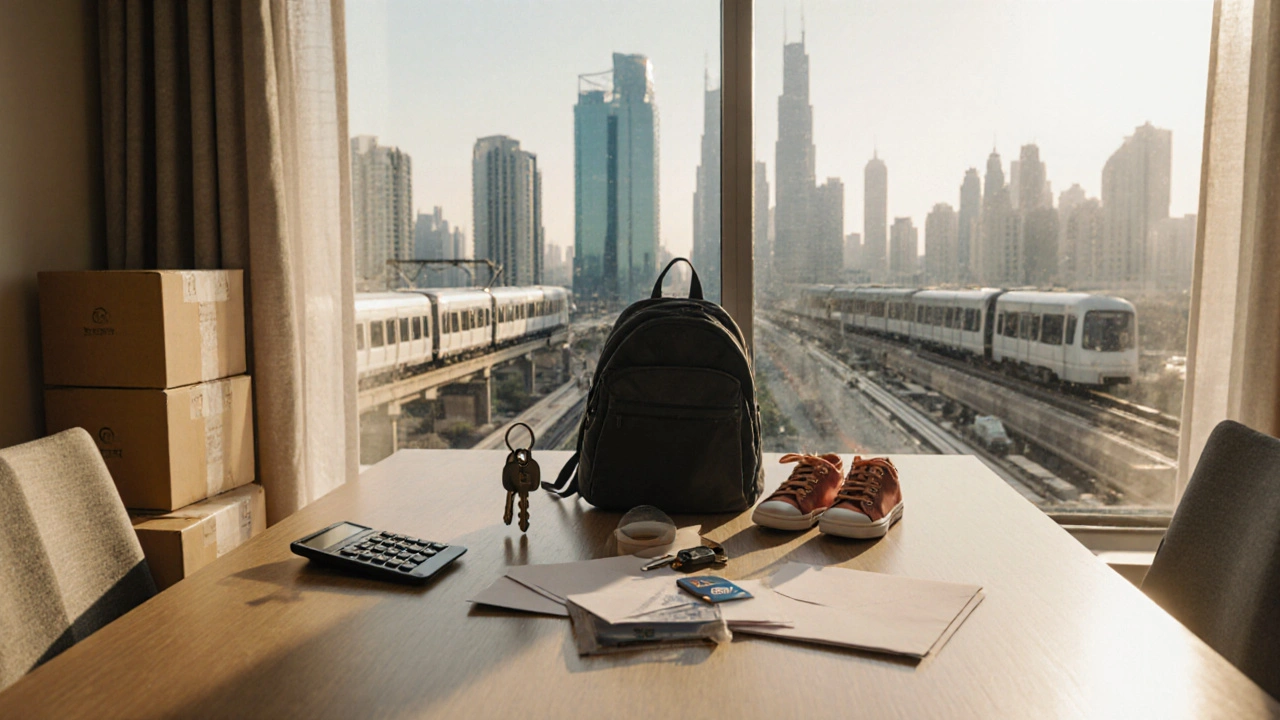Zero income tax sounds great-until rent quotes start landing in your inbox. In 2025, many newcomers find that housing and school fees, not taxes, decide their lifestyle in Dubai a global city in the United Arab Emiratesa Gulf nation known for its no-personal-income-tax policy and high cost of services like housing and schoolingUAE, famous for its business hubs, tourism, and expat community. If you want a quick, honest picture of what you’ll spend each month-and what salary covers it-this guide lays it out with 2025 numbers, area-specific rent ranges, and the annoying hidden fees people forget to budget for. Here’s the short version of the cost of living Dubai question, then we’ll break it all down.
Quick answer
- Solo, frugal (shared place or budget studio in Al Nahda/International City): ~AED 6,000-9,000/month
- Solo, comfortable (1BR near Metro in JLT/Barsha): ~AED 10,000-16,000/month
- Couple, no kids (1-2BR in JLT/Marina/Business Bay): ~AED 15,000-25,000/month
- Family of 4 (2-3BR in Mirdif/Town Square/Arabian Ranches 2): ~AED 22,000-45,000/month (depends a lot on school fees)
- Premium city-center (Downtown/Marina high-floor, frequent dining out): ~AED 30,000-70,000+/month
How to think about your Dubai budget
Three things drive your number: rent, schooling, and transport habits. Everything else (groceries, internet, gym) has smaller variance.
- Rent is usually 35-55% of take-home for singles and couples. For families, school fees can surpass rent.
- Car vs. Metro is a big swing: car ownership adds insurance, fuel, Salik tolls, parking, and maintenance.
- Eating out can double your food bill if you do it often-portions and prices are big.
All figures below are in UAE dirhamthe national currency of the United Arab Emirates; common code AED; 1,000 AED = one thousand dirhamsAED.
Rent in 2025: areas and realistic ranges
Rents surged between 2022-2024 and stayed firm through 2025 in popular areas. Expect negotiation room in older buildings or outer communities. Annual leases are the norm, often paid in 1-4 cheques.
- Budget clusters: Al Nahda, International City, Discovery Gardens (older), Deira (older stock)
- Studio: AED 28k-45k/year (2.3k-3.8k/mo)
- 1BR: AED 40k-65k/year (3.3k-5.4k/mo)
- 2BR: AED 60k-90k/year (5k-7.5k/mo)
- Mid-tier, near Metro/business hubs: JLT, Barsha, Business Bay (mixed), Dubai Silicon Oasis
- Studio: AED 45k-70k/year (3.8k-5.8k/mo)
- 1BR: AED 70k-120k/year (5.8k-10k/mo)
- 2BR: AED 110k-180k/year (9.2k-15k/mo)
- Prime: Dubai Marina, Downtown, City Walk, Bluewaters
- Studio: AED 60k-100k/year (5k-8.3k/mo)
- 1BR: AED 100k-160k/year (8.3k-13.3k/mo)
- 2BR: AED 150k-260k/year (12.5k-21.6k/mo)
- Family communities (villas/townhouses): Mirdif, Town Square, Damac Hills 2, Arabian Ranches 2
- 3BR townhouse: AED 140k-230k/year (11.6k-19.1k/mo)
- 4BR villa: AED 190k-350k+/year (15.8k-29k+/mo)
Watch for “chiller-free” (AC included) vs. “chiller paid by tenant” (district cooling). That single line can move your utilities by hundreds per month.
Hidden housing costs people forget
When you sign, these one-off and monthly extras show up:
- EjariDubai’s official tenancy registration required for legal leases and to set up utilities: ~AED 215-235 (one time per lease)
- Agency commission: typically 5% of annual rent (or AED 5,000 minimum for lower rents)
- Security deposit: 5% (unfurnished) or 10% (furnished)
- Dubai Electricity and Water Authoritythe utility provider for electricity and water connections in DubaiDEWA activation: AED 110-220 fees + refundable deposit ~AED 2,000 (apartment) or ~AED 4,000 (villa)
- Dubai Municipality housing fee: 5% of annual rent, billed monthly via DEWA
- District cooling (if applicable, often by Empowera major district cooling provider in Dubai charging a fixed capacity fee plus consumption): set-up ~AED 200, refundable deposit ~AED 2,000, monthly fixed “capacity” 300-1,000 AED plus usage
- Move-in permits and elevator booking: some buildings require scheduling and a refundable deposit
Utilities, internet, and mobile
Utility bills swing with AC use and whether you pay chiller separately.
- Electricity + water (1BR, non-chiller-free): AED 250-700/month summer, AED 150-400 winter
- District cooling (if applicable): AED 300-1,000 fixed + AED 100-300 usage/month
- Home internet (500 Mbps typical): AED 299-499/month with Etisalata UAE telecom operator providing fixed broadband and mobile plans or dua UAE telecom operator offering home internet and mobile services
- Mobile plan (10-30 GB data + minutes): AED 125-250/month
Pro tip: if you work from home, prioritise stable fiber. Building to building differences are real. Ask neighbors what speeds they actually get at peak times.
Transport: Metro vs car in real numbers
Public transport is clean and simple along the Red and Green lines. Car is faster across spread-out areas but adds fixed costs.
- Metro and buses (managed by Roads and Transport AuthorityDubai’s transport regulator and operator for Metro, buses, taxis, and roadsRTA): monthly pass on Nol carda contactless smart card for Dubai public transport fares ~AED 140 (1 zone), 230 (2 zones), 350 (all zones)
- Taxi base fares are reasonable, but frequent rides add up. Budget AED 400-1,000/month if you mix Metro + taxi.
- Car expenses: fuel ~AED 3-3.4/L; typical monthly fuel AED 200-600 (light to medium usage); insurance AED 1,200-3,000/year; servicing AED 800-1,500/visit; tyres AED 1,200-2,500/set
- SalikDubai’s road toll system that charges per gate pass tolls: AED 4 per gate; parking in paid zones: AED 2-10/hour
If your office sits on a Metro line (Marina, JLT, Business Bay, DIFC, Deira), an all-zones pass is often cheaper than owning a car. If you shuttle between far-flung sites, a car pays for itself in saved time.
Groceries, dining, and lifestyle
- Groceries: single AED 800-1,500/month; couple AED 1,400-2,200; family of 4 AED 2,000-3,500 (big swing from organic vs. conventional, imported brands, and where you shop)
- Eating out: budget meal AED 25-35; mid-range dinner for two AED 150-300; Friday brunch AED 250-500 per person
- Alcohol: retail beer AED 7-12 per can; bar pint AED 40-60; bottle of wine AED 60-120 retail. The 30% alcohol municipality tax has been suspended since 2023; always check current policy when you arrive.
- Gym: AED 150-400/month (community gym can be included in rent)
- Streaming and apps: AED 30-80/month per service
Healthcare and insurance
Employment visas require health coverage regulated by Dubai Health Authoritythe regulator for health insurance and medical services in DubaiDHA. Employers usually provide a plan; dependents may need separate policies.
- Basic-compliant plan (adult): AED 1,500-3,500/year (co-pays apply)
- Mid-tier expat plan: AED 3,500-8,000/year
- Clinic GP visit: AED 150-300; specialist AED 300-600; meds often partly covered
Ask HR what the plan covers: network hospitals, co-pay %, annual limits, maternity, and dental. Two plans with the same premium can feel very different at claim time.

Schooling and childcare
School fees are set and monitored by Knowledge and Human Development Authoritythe regulator of private education and school inspections in DubaiKHDA. Fees vary wildly by curriculum and brand.
- Nursery: AED 2,000-4,500/month
- Primary/middle school: AED 20,000-70,000/year (mid-market often AED 35,000-50,000)
- Premium international schools: AED 80,000-120,000+/year
- Extras: registration fees AED 500-1,500; uniforms AED 700-1,500; bus AED 2,000-6,000/year; activities AED 100-600/month
Families often choose communities around the school they like to cut commute times and bus costs. Touring a campus and reading inspection reports helps you balance cost and quality.
Visas and admin you might pay personally
On employer sponsorship, most of this is covered. If you self-sponsor or bring dependents, expect the following:
- Emirates IDthe UAE national ID card required for residents: AED 170-370 depending on validity
- Medical fitness test: AED 320-750 (service level and location vary)
- Typing center/admin fees: AED 150-400
There’s no personal income tax, but a 5% Value Added TaxUAE-wide consumption tax applied to most goods and servicesVAT applies to most purchases.
What salary do you need?
Because the UAE has no income tax on salaries, your gross is basically your net (allowing for insurance or benefits-in-kind). Use these rules of thumb:
- Rent-to-salary at 25-35% keeps you breathing room
- Aim to save 15-20% monthly after essentials
- Budget an emergency fund worth 3-6 months of core costs
Examples:
- Solo in JLT (1BR ~AED 9,000/mo), utilities/internet AED 700, transport AED 350 (Metro), food AED 1,200, life AED 1,200 → total ~AED 12,450. Comfortable salary: AED 18,000-22,000.
- Couple in Business Bay (1BR ~AED 11,500/mo), car costs AED 1,000, food AED 2,400, utilities/internet AED 900, life AED 2,000 → ~AED 17,800. Comfortable salary: AED 28,000-35,000.
- Family of 4 in Mirdif (3BR ~AED 15,000/mo), two mid-market school fees AED 7,000/mo, car costs AED 1,500, food AED 3,000, utilities/internet AED 1,200, life AED 2,500 → ~AED 30,200. Comfortable salary: AED 45,000-60,000.
| Cost category | Frugal single | Comfortable single | Couple (no kids) | Family of 4 | Premium city center |
|---|---|---|---|---|---|
| Rent | 2,300-3,800 | 6,500-10,000 | 9,000-13,000 | 12,000-20,000 | 20,000-45,000 |
| Utilities (incl. AC) | 200-400 | 300-700 | 400-900 | 700-1,500 | 1,000-2,000 |
| Internet + mobile | 200-300 | 350-600 | 400-700 | 450-800 | 600-900 |
| Transport | 140-500 | 350-1,000 | 700-1,500 | 1,000-1,800 | 1,500-3,000 |
| Groceries | 800-1,200 | 1,000-1,500 | 1,400-2,200 | 2,000-3,500 | 2,500-4,000 |
| Eating out & social | 300-700 | 800-1,800 | 1,200-2,500 | 1,500-3,000 | 3,000-8,000 |
| Health (OOP) | 50-150 | 100-300 | 150-400 | 200-600 | 300-800 |
| Other (gym, apps, etc.) | 100-300 | 200-500 | 300-700 | 400-900 | 800-1,500 |
| Total (approx.) | 4,090-7,050 | 9,300-16,100 | 13,250-21,200 | 17,750-32,100 | 29,700-65,200 |
Cost traps to avoid in your first month
- Underestimating AC: in August, AC is the bill. Ask if the unit is shaded, window-sealed, and whether district cooling is charged separately.
- Skipping the housing fee: the 5% municipality housing fee added to your DEWA bill can surprise newcomers.
- Not checking building age: older towers can mean lower rent but higher power use and more maintenance calls.
- Paying for parking twice: your office may charge for parking even if your building has free spots.
- Restaurant-first lifestyle: two mid-week dinners and a weekend brunch can be AED 1,500+ fast.
Money-saving moves that don’t feel tight
- Live near a Metro station if your job aligns with the Red/Green lines-an all-zones pass from the RTAthe Roads and Transport Authority overseeing public transport is often cheaper than a car.
- Pick “chiller-free” buildings to stabilise cooling costs.
- Shop weekly deals and local brands; imported Western brands carry a premium.
- Furnished vs unfurnished: unfurnished + second-hand from Dubizzle/Facebook groups often beats furnished rent premiums within six months.
- Use happy hours and weekday offers for dining; weekends carry a surcharge in many places.
- Ask HR about allowances (housing, transport, education). They can be big value without boosting your headline salary.
Build your Dubai budget in 10 minutes
- Pick an area and unit size. Use ranges above to set rent + check “chiller-free”.
- Add utilities: AED 300 winter / 700 summer for a 1BR; more for bigger places.
- Choose internet + mobile: AED 450-750 total per month.
- Transport: Metro pass AED 350 or car bucket AED 1,000-1,800/month (fuel, insurance, Salik, parking).
- Food: groceries + eating out using your actual habits (be honest).
- Health: if the employer plan is basic, set aside AED 150-300/month for co-pays and meds.
- Look for one-offs: Ejaritenancy registration fee, DEWA deposit, district cooling deposit, agency commission-spread these across 12 months to annualize.
- Add 10% buffer for price creep and life admin.
- Check what salary leaves you 15-20% to save.
Two-minute glossary of the names you’ll meet
- DEWADubai Electricity and Water Authority-sets up your power and water, bills monthly, holds a refundable deposit
- RTARoads and Transport Authority-Metro, buses, taxis, Salik toll management
- Nol cardthe card you tap on Metro/buses; can hold monthly passes
- Salikroad toll system; AED 4 per gate
- DHADubai Health Authority-regulates health insurance
- Emirates IDyour resident ID card used for everything from banking to telecom
- KHDAeducation regulator; publishes school inspection reports and oversees fees
- Empowerlargest district cooling provider; charges a fixed capacity fee plus usage
Next steps and scenarios
- Single professional on Metro: aim for a 1BR in JLT/Barsha; budget AED 12k-16k/month; salary target AED 18k-24k.
- Couple, one car: 1BR/2BR in Business Bay/Marina; AED 15k-25k/month; salary target AED 28k-35k.
- Family of 4, mid-market schools: 3BR in Mirdif/Town Square; AED 28k-40k/month; salary target AED 45k-60k.
- Remote worker: pick Metro access and chiller-free to keep costs predictable; AED 10k-14k/month is doable outside prime.
Before you sign anything, request: recent DEWA bills, district cooling statements, parking details, and a copy of the building community rules. Fifteen minutes of paperwork review can save you thousands in year one.

Frequently Asked Questions
Is AED 10,000 per month enough to live in Dubai?
It can work for a single person in a shared apartment or a budget studio in areas like Al Nahda or International City, using the Metro and cooking at home. Expect a tight budget: rent 2.3k-3.8k, utilities 200-400, Metro 140-350, groceries 800-1,200, leaving limited room for dining out and savings. For a private 1BR in mid-tier areas, AED 10k is usually not enough in 2025.
How much does a 1-bedroom apartment cost in Dubai in 2025?
Ranges are wide by area and building: AED 40k-65k/year in budget areas (3.3k-5.4k/mo), AED 70k-120k/year in mid-tier (5.8k-10k/mo), and AED 100k-160k/year in prime zones like Marina or Downtown (8.3k-13.3k/mo). Newer towers with amenities and sea views sit at the top of the range.
Do I need a car in Dubai or can I use the Metro?
If you live and work along the Red/Green lines, a monthly RTA Nol pass (AED 140-350 depending on zones) is practical and much cheaper than owning a car. If your job requires cross-town trips away from stations, a car saves significant time but adds costs: insurance, fuel, Salik tolls, parking, and maintenance-often AED 1,000-1,800/month even for modest usage.
What are the typical utility bills for a 1BR apartment?
If AC is included (chiller-free), expect AED 150-400 in winter and AED 250-500 in summer for DEWA. If you pay district cooling separately, add AED 300-1,000 fixed capacity plus AED 100-300 usage monthly. Internet adds AED 299-499; mobile AED 125-250. Summer AC use is the big swing factor.
How much should a family budget for school fees in Dubai?
Mid-market schools often charge AED 35,000-50,000 per child per year; premium schools run AED 80,000-120,000+. Add registration, uniforms, transport, and activities. For two kids in mid-market schools, a monthly equivalent of AED 6,000-9,000 is common when you annualize the total fees and extras.
Are there any taxes on salary in Dubai?
There is no personal income tax on salary in the UAE. A 5% VAT applies to most goods and services, and you’ll see a 5% housing fee on your DEWA bill (based on annual rent). Some leisure categories may have municipality fees or service charges.
What one-time move-in costs should I plan for?
Plan for the security deposit (5-10%), agency fee (about 5% of annual rent or a flat minimum), Ejari (~AED 215-235), DEWA deposit (~AED 2,000 for apartments), and district cooling deposit (~AED 2,000 if applicable). Spread them across 12 months to compare like-for-like with monthly budgets.
What’s a good savings target while living in Dubai?
Aim for 15-20% of take-home after essentials. If you receive housing or education allowances, treat them as part of your safety margin and still save a fixed percentage of base salary. Build a 3-6 month emergency fund to buffer job or rent changes.
